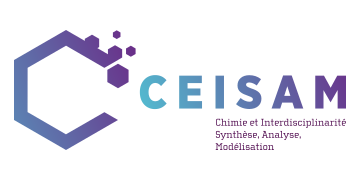Krystal GAILLARD, PhD student in CEISAM SYMBIOSE team, will defend her thesis entitled “Towards the synthesis of amide analogues of cyclic dinucleotides, potential antibacterial, antiviral and
anticancer agents” on December 14th 2021 at 14h in the amphitheater of the Planetology and Geodynamics laboratory on the Lombarderie campus building 4.
Abstract
Cyclic dinucleotides (CDNs) are natural molecules, found in bacteria and eukaryote cells. In bacteria, they are mainly secondary chemical messengers which can regulate diverse biological processes such as biofilm formation. In eukaryote cells, the natural CDNs bonding with the STING protein stimulates antipathogenic signaling pathways.
Chemical modifications of CDNs can be considered so as to grant a resistance against phosphodiesterases while
maintaining the affinity of these cyclic molecules towards the target biological systems. Diverse modifications are reported in literature, including the modification of the internucleosidic linkage. More specifically,
this phosphodiester linkage can be replaced by an amide linkage.
Various synthetic pathways were explored in literature to access these CDNs amidic analogues.
The aim of this thesis work is the synthesis of a constrained bicyclic analogue comprising the amide
linkage. To accomplish this, we established two synthetic pathways to obtain the bicyclic dinucleoside. The first pathway consists in forming the cyclic dimer then bonding the alkenylated amide functions via a metathesis reaction. The second
pathway consists in preparing a linear N-allylated dimer, then forming the bicyclic dinucleoside by a
succession of metathesis and macrolactamization. Several reaction steps such as the amide and carbamate alkylations, the metathesis and the peptidic couplings required synthetic adjustments.
Keywords
cyclic dinucleosides, amide linkage, metathesis, macrolactamization, N-alkylation

